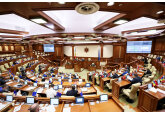
Monitorul Oficial published the IV package of legislative amendments aimed at simplifying the activities of the business environment.
The document concerns 13 regulations, some of them came into force immediately after publication, some will come into force on April 22, and some will come into force after the approval of the by-laws. One of the important changes is that commodity exchanges authorized in the European Union will be able to operate in Moldova if they are officially registered as legal entities in Moldova and meet the minimum requirements of local legislation. The concept of a "commodity exchange" as a whole is to ensure that it is consistent with modern commodity exchange models. Important new elements include: allowing trading in the form of procurement procedures on an electronic platform operated by a commodity exchange; providing the exchange with the ability to manage several categories of markets; greater variety of exchange contracts, etc. This modernization trend will enable electronic transactions and diversification of exchange contracts. From April 22, an amendment will come into force regarding the abolition of the “book of complaints” in physical form and the obligation to maintain it and store it in a visible place. At the same time, in connection with disputes arising between consumers and buyers regarding non-conformity of non-food products, the Consumer Protection Law will provide for a longer period for repair or replacement of goods, but only with the consent of the consumer: instead of 14, up to 30 days will be allowed. There is also provision for the abolition of the norm that allows the consumer to demand a refund if any defect appears within 6 months of using the product. The amendments also provide for the cancellation of the validity period of waybills, the exclusion of statements in relations with the owners of utility networks (natural gas, water and sewerage, electricity, thermal energy). In particular, it will not be necessary to present extracts based on data that is in public registers. There will also be the possibility of remote interaction between operator and consumer. In addition, restrictions on rural houses on the number of rooms and tourists, as well as the range of products used to serve tourists, are lifted. Rural houses will be able to provide food to tourists using their own products grown on the farms of the locality or nearby settlements. Herewith, periodic hygiene training will be provided free of charge and online. //25.03.2024 – InfoMarket.







